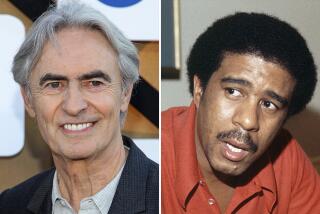1993 Year in Review : CULTURE GAP : The Guys Who Drove a Bigger Wedge Between the Generations
To the tender ear of the average adult right now, there is one sound more grating than any other--an offense audible to the unwillingly attuned even from great distances, as if kids were scratching nails on chalkboards in every available public space. And it goes something like this:
Huh-huh, huh-huh.
Huh-huh, huh-huh, huh-huh.
Huh-huh , huh-huh , huh-huh ,
huh-huh, huh-huh, huh-huh.
Who would have guessed that pubescent antiheroes as inarticulate as Beavis and Butt-head could spawn the greatest generation gap since before the Saigon pullout?
Nowadays, though, it’s the children of the ‘60s on the upper end of the chasm, dismayed at their own progressively bred kids’ affection for such a patently incorrect phenomenon as MTV’s quasi-sociopathic cartoon morons.
“I tried to like them, I really did,” swears typically guilt-addled columnist Brenda Brissette-Mata, writing in the San Diego Union-Tribune. “In fact, it actually bothered me that I didn’t like them. I always wanted to be a cool parent. I don’t want to be part of another ‘older generation.’ But I can’t help it: I really, really hate these guys.”
How does she hate B&B;? Let her count the ways. “I hate it that my sons walk around going ‘heh-heh-heh-heh-heh’ and ‘huh-huh-huh-huh-huh’ like it was some kind of secret code. . . . There are some adults who actually laugh at the antics of these dweebs, but not me. I have just taken a right-hand turn at the fork on this road of life. . . . Nothing is going to get me back into the world where the strange and new and rebellious are eagerly embraced.”
Whoa: Sub-Paleolithic fictions affecting a whole baby-boomer paradigm shift. That’s cool.
There were others joining the chorus of dismay this year. Psychiatrist Dr. Carole Lieberman, who frequently weighs in against TV violence, wasn’t satisfied when MTV bumped the seditious show to a late-night hour so younger children wouldn’t see it.
“I’d be in favor of eliminating the show altogether,” she told The Times. “If we assume that children learn from ‘Sesame Street,’ why do we not assume they’re learning from everything else they see on TV? ‘Beavis and Butt-head’ is a ‘Sesame Street’ for psychopaths.”
Part and parcel of the apocalyptic doomsaying going around about the show is the assumption that, yes, of course it’s completely satirical, but Beavis’ and Butt-head’s 14-year-old-or-so contemporaries don’t know enough to laugh at and not with .
In the case of a 5-year-old--like the famous one in Ohio who apparently set fire to his sister’s bed after seeing Beavis and Butt-head playing with matches on television--the inability to draw the basic distinction between outright mockery and role-modeling is a clear and present danger. And the series clearly didn’t belong on the air at the tot-friendly hour at which it began its run.
But when parents suppose that their teen-agers too are satirically illiterate, a blinding case of gap-itis has set in.
Not only is this the generation that grew up on “Saturday Night Live” reruns and on waves of commercials that mock other commercials, but this is also the generation that came of age watching “The Brady Bunch” knowing it was campy--so, culturally, there’s not much ironic innocence to be lost for most teens at the sweaty hands of Beavis and Butt-head.
And while the patented B&B; snicker may be a thing of annoyance for those unwilling to give in to its Zen sublimity, its manifestation in an imitative youth is no more a sign of impending pyromania than a “ nyuck, nyuck, nyuck “ of a few decades ago signaled an eye about to be put out.
While Beavis and Butt-head descend from a line of “stoner” duos extending from the seminal National Lampoon creation O. C. and Stiggs to Bill and Ted to Wayne and Garth, they represent hormonal teenhood at its most malfeasant, without the cuddly wish fulfillment that pushes “Wayne’s World” so far from the realm of known adolescent reality.
The content of “Beavis and Butt-head” may be (as comic Soupy Sales put it in a disgusted Newsday commentary) “moronic, inane, mean and demeaning, (with) no redeeming merit.” But in a way, its lack of redemption is its redemption: To laugh heartily at the hapless pair’s unchecked id-raging could conceivably be a preemptive act for some kids bordering on Butt-headedness, for these dopes are nothing if not the bad half of Highlights for Children stalwarts Goofus and Gallant, twinned for extra comedic and cautionary measure in an ungallant world.
“I don’t think that this is humor based in idiocy,” says David Marc, who teaches at USC’s Annenberg School of Communications. “I think of ‘Beavis and Butt-head’ as social realism. Most of the negative reaction is a case of cutting off the head of the messenger. This show actually is one of the most insightful into what the effect of television is.”
And the parents who just don’t get it?
“I think it shows that the society has in some ways remained healthy, that parents are (still) baffled and exasperated by what it is that their kids love,” Marc says.
Beavis and Butt-head are all wrong. But, as Pete Townshend once said of Mom and Dad’s generation, the kids are alright.


